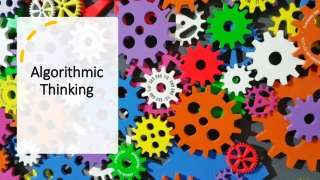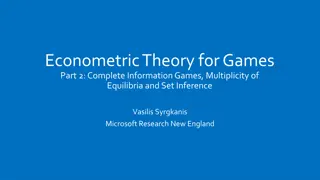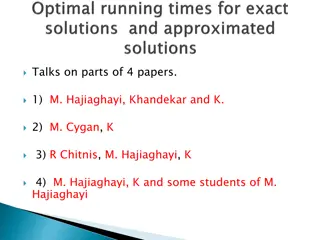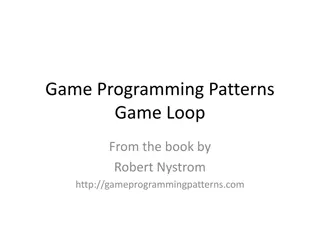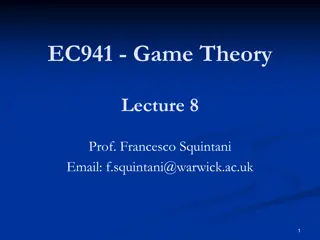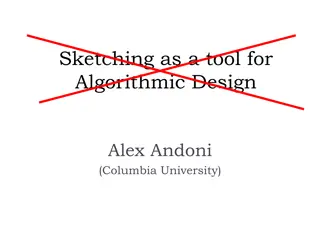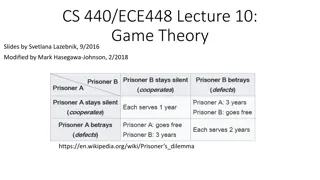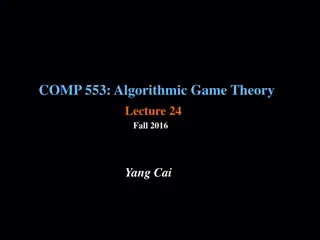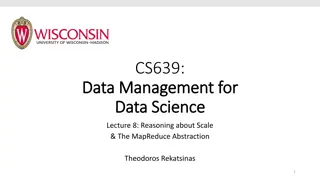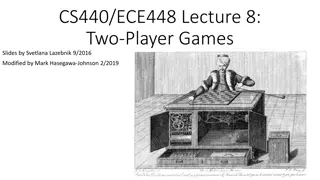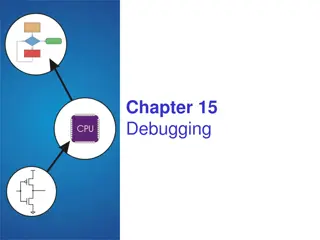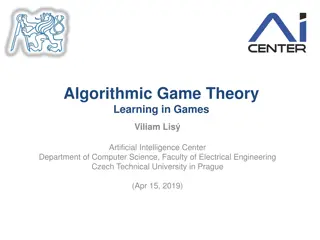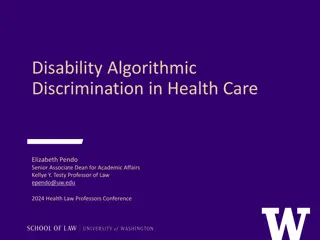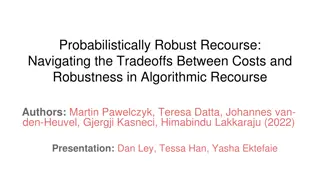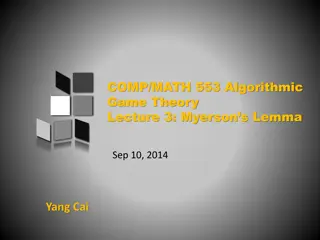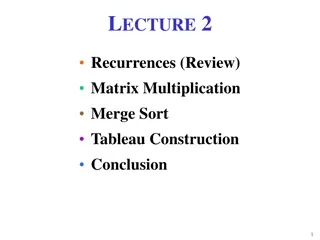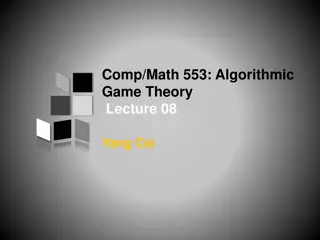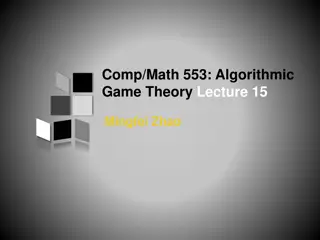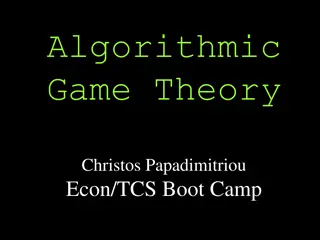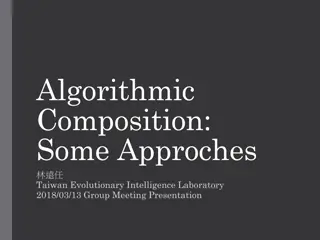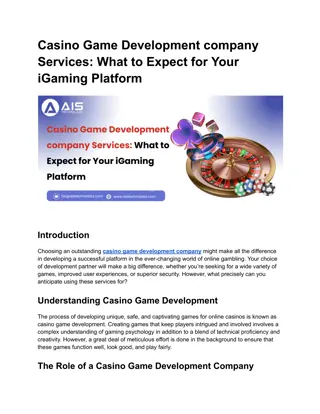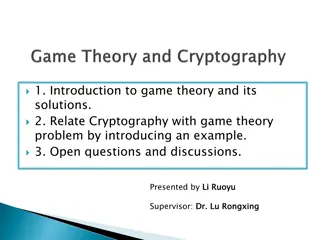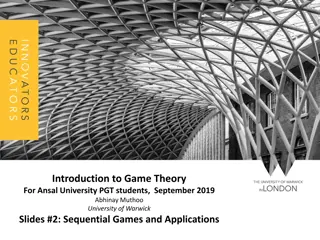Understanding Algorithmic Thinking: Key Concepts and Importance
Algorithmic thinking is a crucial skill that involves problem-solving through precisely defined instructions. This competency, applicable beyond computing, entails analyzing problems, identifying steps to solve them, and designing efficient algorithms. The importance of algorithmic thinking lies in
1 views • 13 slides
Introduction to Econometric Theory for Games in Economic Analysis
This material delves into the fundamentals of econometric theory for games, focusing on estimation in static and dynamic games of incomplete information, as well as discrete static games of complete information, auction games, and algorithmic game theory. It covers basic tools, terminology, and main
8 views • 31 slides
How can MR game developers ensure accessibility and inclusivity in their game designs
As the world of Mixed Reality (MR) Game Development continues to evolve, developers increasingly recognize the importance of accessibility and inclusivity in their game designs. Creating experiences that are accessible to players of all abilities not only expands the reach of your game but also fost
1 views • 5 slides
Is Croquet the Ultimate Garden Game? | MegaChess
In the 1860s, croquet as a game kicked up in the United Kingdom, further the years passed when its popularity peaked and this game was adopted by the United States and then it went to other countries. The game of Croquet played in the garden is a fun-to game starting from the afternoon and going thr
2 views • 8 slides
Overview of Cooperative Game Theory and Bargaining Solutions
Cooperative game theory explores situations where players have mutual benefits in cooperating. The focus is on bargaining solutions to reach agreements despite conflicting interests. Key concepts include Nash Bargaining Solution, Kalai-Smorodinsky Bargaining Solution, and Rubinstein Bargaining Proce
1 views • 24 slides
HotFuzz: Discovering Algorithmic Denial-of-Service Vulnerabilities
A detailed exploration of algorithmic complexity bugs and insight into distributed micro-fuzzing methods. The study uncovers vulnerabilities through guided micro-fuzzing approaches, emphasizing the importance of AC bug detection and fuzz testing techniques such as seed inputs, fuzz observations, and
0 views • 14 slides
Understanding the Right to an Explanation in GDPR and AI Decision Making
The paper delves into the necessity for Explainable AI driven by regulations such as the GDPR, which mandates explanations for algorithmic decisions. It discusses the debate surrounding the existence of a legally binding right to explanation and the complexities of accommodating algorithmic machines
0 views • 22 slides
Evolution of Algorithms and Computer Science Through History
The history of algorithms and algorithmic thinking dates back to ancient times, with the development of general-purpose computational machines by Charles Babbage in the 19th century marking a significant advancement. The term "computer science" emerged in 1959, encompassing theoretical computer scie
1 views • 39 slides
Computational Thinking, Algorithms & Programming Overview
This unit covers key concepts in computational thinking, including decomposition, abstraction, and algorithmic thinking. Decomposition involves breaking down complex problems, abstraction focuses on identifying essential elements, and algorithmic thinking is about defining clear instructions to solv
1 views • 5 slides
Econometric Theory for Games: Complete Information, Equilibria, and Set Inference
This tutorial series discusses econometric theory for games, covering estimation in static games, Markovian dynamic games, complete information games, auction games, algorithmic game theory, and mechanism design. It explores topics like multiplicity of equilibria, set inference, and mechanism design
1 views • 23 slides
Understanding Algorithmic Thinking in Digital Systems
Explore the application of algorithmic thinking in digital systems through the journey of Mike Clapper, the Executive Director of AMT. Learn about recognizing patterns in data, creating algorithms to solve problems, and utilizing information systems creatively. Enhance your knowledge of digital syst
0 views • 56 slides
Insights into Advanced Algorithmic Problems
Delve into discussions surrounding complex algorithmic challenges, such as the limitations in solving the 3-SAT problem within specific time bounds, the Exponential Time Hypothesis, proving lower bounds for algorithms in various scenarios, and exploring approximation ratios in algorithm design. Thes
1 views • 65 slides
Game Programming Patterns Game Loop Summary
This content discusses the game loop structure in game programming patterns, comparing simple main loops and modern event-driven programs. It covers the continuous movement of a game even without user input, the importance of running at a fixed frame rate, and the implementation of frame rate contro
0 views • 14 slides
Game Clock Operator Guidelines and Responsibilities
Guidelines and responsibilities for game clock operators, including dress code, rules study, pre-game preparations, and in-game conduct. Operators must be qualified, familiar with game timing procedures, and maintain focus on accurate timekeeping. Follows procedures for pre-game, game-time operation
0 views • 19 slides
Understanding Ultimatum Game in Game Theory
Ultimatum game is a fundamental model in game theory where two players engage in bargaining. Player 1 offers a share of money to Player 2, who can either accept or reject the offer. If accepted, Player 1 receives the remainder; otherwise, both get nothing. The formal model, extensive form representa
0 views • 38 slides
Sketching as a Tool for Algorithmic Design by Alex Andoni - Overview
Utilizing sketching in algorithmic design, Alex Andoni from Columbia University explores methodologies such as succinct efficient algorithms, dimension reduction, sampling, metric embeddings, and more. The approach involves numerical linear algebra, similarity search, and geometric min-cost matching
0 views • 18 slides
Understanding Game Theory: Applications and Concepts
Game theory delves into systems of interacting agents where outcomes depend on each agent's actions. Explored in various fields, it helps in agent design and mechanism design for optimal strategies and rule-setting. Topics covered include Nash equilibrium, coordination games, anti-coordination games
0 views • 39 slides
- Rust: A Hardcore Survival Game Experience
- Rust, developed by Facepunch Studios and presented by Ben Walker, immerses players in a challenging survival game where they awaken on an island with nothing but a rock. The goal is to gather resources, craft tools, build shelter, and defend against other players. With multiplayer interactions and
0 views • 19 slides
Algorithmic Issues in Tracking: A Deep Dive into Mean Shift, EM, and Line Fitting
Delve into algorithmic challenges in tracking tasks, exploring techniques like mean shift, Expectation-Maximization (EM), and line fitting. Understand the complexities of differentiating outliers and inliers, with a focus on segregating points into best-fit line segments.
0 views • 44 slides
Understanding Greedy Algorithms in Algorithmic Design
Greedy algorithms in algorithmic design involve making the best choice at each step to tackle large, complex problems by breaking them into smaller sub-problems. While they provide efficient solutions for some problems, they may not always work, especially in scenarios like navigating one-way street
1 views • 9 slides
Enhancing Algorithmic Team Formation Through Stakeholder Engagement
Integrating stakeholder voices is crucial in algorithmic team formation to ensure a positive team experience, quality outcomes, and high performance. This research explores learner-centered approaches and considers various team formation methods, highlighting their strengths and weaknesses in educat
0 views • 37 slides
Understanding Brouwer's Fixed Point Theorem and Nash's Proof in Algorithmic Game Theory
Explore the foundational theorems of Brouwer and Nash in Algorithmic Game Theory. Dive into Brouwer's Fixed Point Theorem, showcasing the existence of fixed points in continuous functions. Delve into Nash's Proof, unveiling the Nash equilibrium in game theory. Discover visualizations and constructio
0 views • 23 slides
Understanding Scalability and Algorithmic Complexity in Data Management for Data Science
This lecture delves into the concept of scalability in data management for data science, covering operational and algorithmic aspects. It discusses the importance of efficient resource utilization, scaling out to multiple computing nodes, and managing algorithmic complexity for optimal performance i
0 views • 47 slides
Proposal for Directive to Enhance Working Conditions in Platform Work
The proposal aims to address challenges in platform work, including employment status classification and algorithmic management issues. It seeks to improve transparency, fairness, and accountability in algorithmic decision-making, correctly determine employment status, enhance transparency in platfo
0 views • 13 slides
Understanding Two-Player Games and Game AI Evolution
Explore the significance of studying games, origins of game AI algorithms like Minimax, Alpha-beta search, and more. Learn about types of game environments, zero-sum games, strategies in two-player games, and game trees. Delve into the complexity of game theory and the evolving landscape of artifici
0 views • 38 slides
Understanding Debugging in High-Level Languages
Debugging in high-level languages involves examining and setting values in memory, executing portions of the program, and stopping execution as needed. Different types of errors – syntactic, semantic, and algorithmic – require specific debugging approaches. Syntactic errors are related to code l
0 views • 9 slides
Theories of Interest in Microeconomics II
Explore various theories of interest in economics, including the Classical Theory, Liquidity Preference Theory by Keynes, Productivity Theory, Abstinence Theory, Time-Preference Theory, Fisher's Time Preference Theory, and the Loanable Fund Theory. These theories offer different perspectives on the
0 views • 6 slides
Algorithmic Game Theory Learning in Games by Viliam Lis
The content discusses the concept of algorithmic game theory learning in games, covering topics such as online learning, prediction, best response dynamics, and convergence to Nash equilibrium. It explores how simple learning agents achieve equilibrium outcomes and the application of algorithms in v
0 views • 23 slides
Algorithmic Discrimination in Health Care: Protecting Vulnerable Patients
Elizabeth Pendo and Jennifer D. Oliva discuss disability discrimination in health care algorithms, advocating for legal protections under Section 504, ADA, and ACA. Their article proposes strategies to combat algorithmic bias and enhance antidiscrimination efforts in the 2024 Section 1557 final rule
0 views • 13 slides
Navigating Tradeoffs in Algorithmic Recourse: A Probabilistic Approach
This paper introduces PROBE, a Probabilistically Robust Recourse framework allowing users to balance cost and robustness in algorithmic recourse. Users can choose the recourse invalidation rate, enabling more tailored and efficient recourse management compared to existing methods. PROBE enhances cos
0 views • 17 slides
Understanding Myerson's Lemma in Algorithmic Game Theory
Myerson's Lemma is a fundamental concept in algorithmic game theory, particularly in the context of Sponsored Search Auctions. This lecture delves into the application of Myerson's Lemma to ensure truthful bidding as a dominant strategy, maximize social welfare, and maintain polynomial running time
0 views • 19 slides
Understanding Algorithmic Complexity Measures and the Master Method
In this study, we explore key concepts in algorithmic complexity, including recurrences, matrix multiplication, merge sort, and tableau construction. We delve into the Master Method for solving recurrences, examining Cases 1, 2, and 3, and providing solutions for each scenario. Additionally, we disc
0 views • 61 slides
Mechanism Design and Auction Theory in Game Economics
Today's lecture covers the concepts of mechanism design and single-item auctions in the field of algorithmic game theory. Mechanism design focuses on reverse-engineering existing game systems to achieve desired objectives, while auctions play a crucial role in various scenarios such as online market
0 views • 30 slides
Algorithmic Game Theory Lecture on Prophet Inequality and Auction Design
In this lecture on Algorithmic Game Theory, Mingfei Zhao discusses the Prophet Inequality and its application to single-item auctions. The lecture covers the concept of Prophet Inequality, strategies to guarantee expected payoffs, and different auction designs such as the Bulow-Klemperer Theorem and
0 views • 10 slides
Evolution of Algorithmic Game Theory in Computer Science
The evolution of Algorithmic Game Theory (AGT) in the realm of Computer Science showcases the intersection of economics and theoretical computation. Before 1995, notable researchers like von Neumann and Megiddo laid the foundation for AGT. Concepts such as computation as a game, bounded rationality,
0 views • 62 slides
Exploring Algorithmic Composition Techniques in Music Generation
Algorithmic composition involves the use of algorithms to create music, mimicking human composers by generating music based on specific rules and structures. This presentation delves into various approaches such as DeepBach, MuseGAN, and EMI, highlighting the use of evolutionary algorithms, machine
0 views • 35 slides
Understanding Game Abstraction and Equilibrium
Extensive-Form Game Abstraction with Bounds delves into the complexities of game abstraction, exploring theoretical guarantees, algorithmic challenges, and equilibrium-finding processes. The difficulty of game abstraction is examined, highlighting issues such as pathologies and the struggle to optim
0 views • 22 slides
Casino Game Development company Services_ What to Expect for Your iGaming Platform
Discover what to expect from a casino game development company, including casino game developers, casino game development, and casino game development services.\n\nSource>>\/\/medium.com\/@aistechnolabspvtltd\/casino-game-development-company-services
0 views • 4 slides
Understanding Game Theory and Its Application in Cryptography
Game theory involves analyzing conflicts and cooperation among decision-makers, providing mathematical models for decision-making. By relating cryptography to game theory, we can see how rational agents make choices to maximize utility. The example of the Prisoner's Dilemma highlights strategic deci
0 views • 38 slides
Understanding Sequential Games in Game Theory
Explore the concept of sequential games in game theory through an entry deterrence game involving an incumbent monopolist and a potential entrant. The game tree depicts various outcomes based on choices made by players, leading to discussions on Nash Equilibrium, credible commitments, and backward i
0 views • 17 slides
